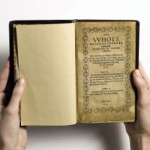
Continued here:
What makes a book sacred?


Continued here:
What makes a book sacred?
by
‘@Pete: I feel the same way, since I can’t read the German of my great-grandfather’s Bible. But I think there’s a certain presence to just holding the book, imagining its history, etc, etc, just as you talk about.
@Badger: This is an interesting question. I wonder if there are ways we can consider other Christian writings to be “sacred” in some way without calling them “scripture” or violating the sola scriptura principle. Something worth thinking about. And in that vein, who would we add to such a list? I suspect every person might have their own take on whose writings have deepened or enhanced their spiritual life in some way. I wonder if we’d end up with something similar to Chemnitz’s “Catalog of Testimonies.”
thanks travis – made me want to get up and go look at a book my dad gave me a few years ago (one that i didn’t even know he had) – a 1598 copy of aristotle’s organon. it’s in greek and latin, so i can kind of read it, but mostly i just like to look at it and think about all the places it has been and all the people who have read it.
Interesting, especially liked the Li-Young Lee quote. How sacred would you say the post Biblical books are? I am referring to the prominent Christian teachers from Clement of Rome to A.W. Tozer.
Leave a Reply
You must be logged in to post a comment.